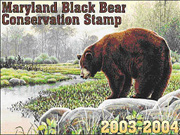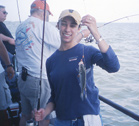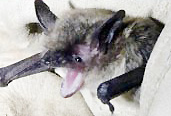2003: The Year in Review
Creatures
My Second Chance
Sometimes it takes a third party to link you to your children
When my 15-year old daughter, Elin, got on this horse’s back, they connected like a plug going into a socket that turns on a lamp. For a turbulent year, he was the only link between her and me. No matter what our differences, we could always talk about Tangier. I could see growing in her the same bond with a horse I had had, and I rejoiced for her, especially during the times when I was not sure how to survive her teen-age tempests.
—Aloysia Hamalainen • No. 6, Feb. 6
A New Oyster’s Coming to Chesapeake Country
Down in the salty Virginia Bay, where disease has about wiped out Crassostrea virginica, the oyster named for its abundance there, a new oyster will be planted this spring. On February 25, Virginia approved a plan that would allow a handful of watermen to cultivate one million of the Asian wonder oyster, Crassostrea ariakensis.
—April Falcon Doss • Dock No. 9, Feb. 27
The Year of the Turtle
Follow a turtle for a year, and you’ll be wiser for it
Some of us go to work every day. Chris Swarth goes on a treasure hunt — sometimes on foot, sometimes paddling a kayak, sometimes diving into tangles of greenbriar and poison ivy.
What treasure does he seek? Not gold or silver but a gem of bones, scales and muscle — a living, moving fossil — a work of standard-setting endurance that is endearing to even the most hardened of heart: the female box turtle.
Swarth’s box turtle studies raise red flags on environmental health in Maryland and beyond.
—Martha Blume • No. 19, May 1
It’s a Dog’s Life
For years, the morning’s rush to work has included stops for coffee and dropping the little ones at day care, the older kids at school. These days, one more stop has been added to the morning routine. That’s to drop Fido off at doggie day care.
While their owners are at work, the dogs will go for walks, play fetch, hang out with their canine buddies and maybe even get a massage.
At four pet resorts in Chesapeake Country –— Noah’s Ark Boarding Resort in Millersville, Happy Tails Pet Resort in Crownsville, Countryside Kennels in Owings and The Perfect Pet Resort in Lothian — prices for doggie day-care range from $12.50 to $15 per day. Extra amenities add to the cost.
—Nancy Hoffmann • No. 20, May 15
To Be or Not To Be
Chesapeake Country’s mute swans get a reprieve
It’s analogous to a death row inmate receiving a call from the governor at the very last minute. Due to a lawsuit filed May 16 in Washington, D.C., the mute swan population in Chesapeake Country has been saved — at least for now.
One month into the Maryland Department of Natural Resources “lethal strategy” to control mute-swan populations, all mandated killing of such swans has been halted by litigation filed by the Fund for Animals with several Eastern Shore residents.
—James Clemenko • No. 21, May 22
Three Strikes and They’re Out
Mute swan reprieve soon to end — slaughter to continue
The saga of Chesapeake Country’s mute swans continues as the U.S. Fish and Wildlife Service announced this month that the killing of these non-native creatures could continue as early as August 1.
To counter a lawsuit filed May 16, U.S. Fish and Wildlife drafted an environmental assessment. If the assessment is approved, states including Maryland could reduce their mute swan population.
—James Clemenko • No. 28, July 10
Bay Life — Who Could Love the Horseshoe Crab?
What good are horseshoe crabs? You can’t eat them, so who cares whether there are fewer of them to go around?
The answer to that question is perhaps the most intriguing aspect of the horseshoe crab. When millions of horseshoe crabs line the Delaware Bay beaches to spawn, something happens the likes of which can rarely be seen on this planet.
— Steve Carr • No. 24, June 12
 Bears Beware
Bears Beware
Next year, firearms may replace stamps as Maryland’s preferred method of bear control
The lone black bear on Steve Oliver’s 2003 competition-winning painting may be the last ever inked onto the Maryland Black Bear Conservation Stamp.
Since its birth in 1996, the Bear Stamp has raised money to pay farmers whose crops were damaged by bears. But this year the Maryland Black Bear Task Force recommended that the Maryland Department of Natural Resources “discontinue the sale of Black Bear Conservation Stamps as a revenue-generating program.”
To cut the losses, the task force wants bears to pay for the damage they do. Bear hunting, they suggest, would keep bear population and damages down while raising money from hunting licenses.
—Eric Smith • Dock No. 29, July 17
 Fish Are Like Us
Fish Are Like Us
I, myself, caught a lovely silver fish the other day. My first fish ever, a 19-inch rockfish.
It didn’t speak to me, but it did move. It breathed. It looked into my eyes. And then it hit me. No, not the fish, but that the fillets I had been eating all these years might come from an underwater world similar to my own.
Why do I sound so shocked, you ask?
Because if you asked me — before this summer — to describe fish, I’d not take too long to respond with a pat on my tummy, a lick of my chops and a drooling declaration of “delicious!”
Ask me now, and you’ll hear something different.
—Lauren Silver • No. 32, Aug. 7
Do You Believe in Magic?
Maryland’s little horse that could is alive and racing
The Little Engine that Could has gained a place in our hearts by overcoming obstacle after obstacle to achieve success. The thoroughbred race horse Magic Weisner looks like Chesapeake Country’s little engine that could.
Who thought the little gelding from Laurel could come close to winning the 2002 Preakness Stakes? Magic triumphed not by winning — he came in second — but my sprinting his way to glory, showing us what the horse next door could be.
Magic Weisner scored a first of another sort later that year by becoming the first race horse in Maryland stricken with the West Nile virus, which nearly ended his life. Like the little engine that could, Magic fought the disease.
Ten months after catching the West Nile bug, Magic returned to racing. At Laurel Park, Magic Weisner was a popular favorite, with odds as low as 6-5. With people in the grandstand cheering for him, he began his comeback to the form that made him a Maryland sporting namesake.
But the magic wasn’t there. He finished last, a little over 20 lengths behind the winner. He completed the seven furlongs course, but he struggled from the start.
—James Clemenko • Dock No. 33, Aug. 14
State Reptile Feels the Ax
Maryland’s money-saving recipe makes soup of terrapins
Just a few days after her job was abolished at Maryland’s Department of Natural Resources, 50-year-old Marguerite Whilden and her terrapins set out on their own .
Whilden — who takes her popular Terrapin Station far and wide to encourage public support and involvement in conservation — was one of eight Natural Resources employees who lost their jobs to the Board of Public Works decree carrying out Gov. Robert Ehrlich’s decision last month to cut $208 million in state spending.
—M.L. Faunce • Dock No. 33, Aug. 14
Think Like a Raccoon
Vaccine will hit the ground near you
We think of raccoons as benevolent creatures; they don’t bring on that primordial chill to the backs of our necks like bats or fat garden spiders might.
They do, however, pose a rabies threat, and that’s why they’re the target of an aerial bombardment campaign launched by the Anne Arundel County Health Department this week. This year the Oral Rabies Vaccine Project goes county wide, extending its earlier success in contained peninsulas.
Using a Maryland State Police helicopter, an airplane and a handful of automobile teams on the ground, the health department will scatter about 78,000 doses of rabies vaccination throughout the county over the next two weeks. The Raboral V-RG vaccine, which was first used in Europe, is embedded in chunks of fishmeal polymer bait. Once a raccoon bites into the morsel, a bag inside the bait bursts open, delivering the vaccine to the raccoon. Trivia tidbit: Each serving of the vaccine costs $1.27.
—John L. Guerra • Dock No. 34, Aug. 21
Where Have All the Bluebirds Gone?
The bluebird’s bright blue and red colors set it apart from other birds. Only the male goldfinch decked out in its dazzling yellow mating plumage or the flashy red male cardinal can compete with the flamboyance of a male bluebird.
But far fewer Eastern bluebirds are nesting in bluebird-rich Calvert and Anne Arundel Counties this year than last. No formal studies have been done, but Arlene Ripley, coordinator of the Calvert Bluebird Council, blames the heavy winter snows and the cool, wet spring this year.
Bluebirders don’t think like you and me. They were praying warmer summer weather would mean more insects to help the birds rebound.
Their prayers were not answered. So Arlene Ripley continues to have a blue summer. “I expect next year to be bad, too,” she says.
—Vivian I. Zumstein • No. 34, Aug. 21
Seahorses School in Calvert
Marking 350 years with a new species
By the lucky, seahorses are sometimes seen in Chesapeake Bay. But nobody had ever before seen anything like the herd that stampeded through Calvert County last week. The usual seahorse of Chesapeake Bay is little hippocampus erectus, the lined seahorse. These were a new giant species; call them hippocampus Calvertus.
Think of them as giant party favors in the county’s 2004 celebration of 350 years.
“They’re our equivalent to Chicago’s cows, Baltimore’s fish and Washington’s Party Animals,” explained Stacey Hann-Riff of Annmarie Garden, one of three dozen sponsors of the public arts project known as Seahorses by the Bay.
“But our project has one big difference,” added seahorse chair Sue Apple. “Ours are designed by Calvert Country school children.”
—Sandra Martin • No. 41, Oct. 9
 When Bats Come Out to Play
When Bats Come Out to Play
The creature that zips through Halloween legend bears little resemblance to the bats that live among us in Chesapeake Country from late spring to early fall.
Fear of bats is primal, some psychologists believe, like the natural revulsion many have to spiders, snakes and mice. But if you hate mosquitoes and love local produce — or just enjoy a good show on a summer’s evening — you might come to see bats in a new way.
—Vivian I. Zumstein • No. 44, Oct. 30
to the top